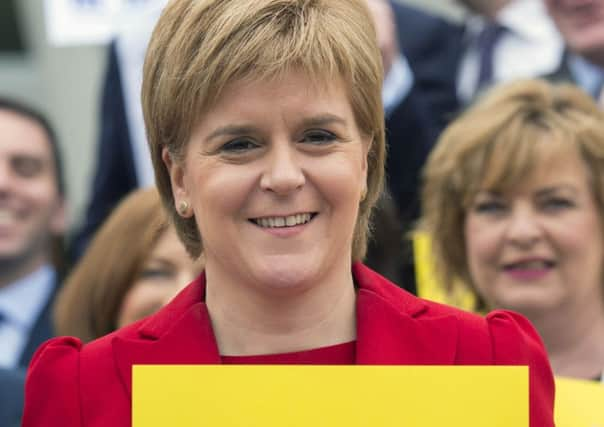Paris Gourtsoyannis: No simple solution to complex issue of Brexit


As versatile as it is, the English language can sometimes lack precise terms to describe intangible ideas. The French have helpfully given us the word “yakafokon” - the helpless burbling of officialdom when faced with a problem too great and too complicated to have any hope of getting to grips with.
It looks like it should be a rude word, but it’s actually just the sound a confused manager makes when unconvincingly setting out (in French) a simple solution to an unfathomably complex issue: “All we have to do is...”
Advertisement
Hide AdAdvertisement
Hide AdThe six months since the EU referendum have largely unfolded to a soundtrack of uninterrupted yakafokon. Today Nicola Sturgeon will attempt to break through the noise with the publication of the Scottish Government’s options for Brexit.
The First Minister appeared to have seized the initiative with singular clarity and authority when she stepped forward in the hours after the EU referendum result to claim a second independence referendum was “highly likely”.
Her decisiveness has in retrospect increasingly come to resemble the opening blast of yakafokon - an overly-simplistic answer given too quickly.
Today’s publication will try to correct that impression, giving us a selection of worked-through possibilities to maintain Scotland’s place in Europe that have been considered by two panels of eminent independent experts.
It will seek to make a case in measured and reasonable way: that Scotland voted to Remain, and is willing to compromise, but has the right to go it alone if its terms aren’t met.
Given Ms Sturgeon’s paper is the first time any government on these islands has written down what it wants its relationship with the EU to be, it deserves some credit. The publication itself, however, is unlikely to tell very much we don’t already know.
The bulk of the First Minister’s Brexit Christmas has already been telegraphed. She wants the ability to trade with the single market without tariffs or barriers, she wants control over immigration and a continuation of free movement in order to do so, and she wants powers returning from Brussels over things like employment law and fisheries, to end up with Holyrood.
Much of what Ms Sturgeon wants also fits the bill for Brexit moderates and pragmatists south of the border - a continuation of close ties with the EU that make the best of a bad lot. A Norway-style arrangement where the UK pays for access to the single market is a sound basis for political alliances that span the UK - and if a deal could be done to give Scotland the same kind of control over immigration that exists in parts of Canada and Australia, such an arrangement could expect broad support.
Advertisement
Hide AdAdvertisement
Hide AdHowever, we also know that crucial elements of Ms Sturgeon’s wish list have already been ruled out by UK ministers, and other parts look unlikely. Downing Street continues to insist that there will be a single UK exit deal, that it will be negotiated by UK ministers, and that devolution of immigration was inconceivable.
If those two positions are irreconcilable, could today’s publication be another exercise in wasted words? The past few weeks have also seen the possibility of a transitional deal to ease the UK played up in the media, with the encouragement of ministers fearful of ruling anything in or out.
Like any aspect of the UK’s deal, however, a transition would need to be approved by EU leaders ill-disposed to making Brexit too comfortable. The European Commission’s chief negotiator, Michel Barnier, has reportedly said such a deal would only be discussed at the end of the statutory two-year negotiation period - when time could well run out.
There’s another significant danger in loose talk of transitional deal. Signals are growing from within Whitehall that if the UK Government was willing to grant a second referendum on Scottish independence, it would only do so with a ‘sunrise clause’ - a stipulation that the vote can only take place after Brexit.
In that scenario, pro-EU Scots who are pragmatic rather than passionate unionists would have no reason to waver over independence, if ties to Europe were already severed. But if Brexit feels much the same as staying in the EU, with a transitional deal keeping in place many if not all the benefits of single market membership, the risks of a post-departure independence referendum after 2019 would be reduced. A transition out of Europe could just as easily serve as a transition back in.
After a year of yakafokon, in 2017 attention will turn from the circular debate over what the UK wants from Brexit to what the EU is willing to offer.
The signs are that Europe’s resolve is hardening. Last week, as well as forcing Theresa May to make her own dinner plans, EU leaders agreed a format for Brexit negotiations that will restrict the UK’s ability to form alliances with friendly European governments.
While the EU has been better at hiding it than the UK Government, Brexit is just as messy in Brussels as in London. A power struggle between the Commission and the European Parliament has seen the Commission, whose adherence to the pillars of the EU is institutional rather than political, emerge victorious. Mr Barnier, who says he doesn’t understand the term ‘soft Brexit’ and wants the UK to pay £50 billion on departure from the EU, will take the lead.
Advertisement
Hide AdAdvertisement
Hide AdAnd Switzerland, which was seen as a test case for Brexit in its bid to shake off the single market requirement for free movement of people, has come back to the table with a climb-down proposal to merely allow Swiss citizens first refusal on jobs.
Plans are welcome, but it will be months before the sound of yakafokon dies down.